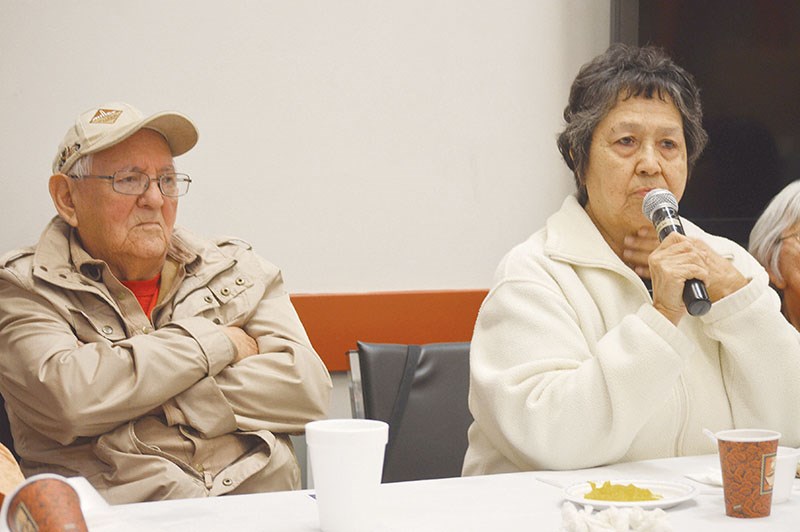Ginger Gosnell-Myers recalls her father’s anger over his past as a residential school survivor and how it took his life early.
She’s also heard from countless other survivors from her work as the City of Vancouver’s aboriginal planner. At her job, she helped coordinate a national event so that many survivors, many only speaking for the first time during the Truth and Reconciliation Commission (TRC) process, could share their stories.
“Reconciliation is a very difficult concept to understand. It’s very personal,” she said.
Gosnell-Myers was one of the guest speakers at the Squamish Multifaith Association’s fifth annual dinner, Unity in Diversity, on Oct. 24 at the Squamish Nation’s Totem Hall. The theme of the evening was “The Road to Reconciliation.” Councillor Josh Joseph of Squamish Nation and District of Squamish Councillor Susan Chapelle were also speakers.
Gosnell-Myers said she saw firsthand how her father’s experience at residential school affected him, how angry it made him, why he pushed his children so hard to work until he finally wore down, dying young of a heart attack.
It was when she started college in Nanaimo that she began to meet others from families with similar experiences, with tales of violence or alcoholism or virtual silence about what had happened at the schools.
While each story is unique, for Gosnell-Myers there is an undercurrent that unifies the residential school narrative.
“First Nations people all experienced the same thing, the same level of violence, the same level of mistreatment,” she said.
For many, the TRC process has been the first time they could speak openly about what had happened.
At the Unity in Diversity event, elders Bob Baker (Kiyo-wil), Shirley Toman (Hum Te Ya) and Gwen Harry (Che Sha) shared their own experiences with the approximately 75 people who attended the dinner.
For them, it meant abuse in all forms. It meant being torn from family and friends, or not being able to talk to cousins of the opposite sex at the same school. It meant losing one’s language.
“You forget your language,” Baker said. “I thought all the Natives spoke the same language.”
It even meant losing one’s own ancestral name. Harry pointed out that her other name is really a term of endearment because she cannot recall what name she had originally been given.
Hum Te Ya prefers using her traditional name and elaborated on another effect of losing one’s own name. “One of the things we lost is we don’t know who we’re related to anymore,” she said.
On top of this, while she does know her original name, it does not tell her everything she wants to know, in part because her family did not teach her their traditional language for fear that it would cause problems for her with the outside world, specifically the residential school system.
“I don’t know what my name means because the translation is lost,” she said.
Joseph (Skwetsi7meltxw), the first guest speaker, recalled his own father’s troubles as a survivor and underscored the multigenerational pain that the schools have caused, saying the experience is not something that people can “just get over.” He also reminded the audience that the last school closed only in 1996.
“For us to reconcile, to heal as a nation, we must understand the truth,” he said. “When people say, ‘That happened 100 years ago,’ no, that happened in my generation.”
When Chapelle spoke, she touched on the experiences of her own Jewish ancestors in Europe during the Second World War as well as her work experience with displaced aboriginal teens, which marked the first time she had heard of residential schools and prompted her to start pushing for health-care equality.
At the end of her talk, she underscored the need for true integration rather than one group simply teaching another its culture.
“It comes from dialogue, it doesn’t come from lip service,” she said.
Chapelle said she was hopeful the multifaith association could act as a multicultural association.
The Squamish Multifaith Association, which includes Christian, Muslim, Sikh, Baha’i and First Nations members, aims to promote interfaith understanding through lectures or events like the annual dinner.



